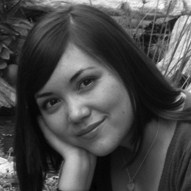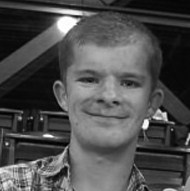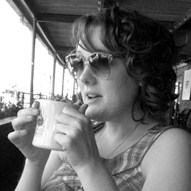 Fiction Editor Frederick “Brandon” Raehl is a senior at ASU completing concurrent degrees in Psychology and Literature, Writing, and Film. As well as working in healthcare as a CT Technologist, he plays music, writes screenplays, and develops black and white photographs. After completing his honors thesis in psychology titled, The Effect of Workload on Academic Performance, his time is now devoted towards writing. Though his current ambitions outside of college are unclear, he intends on using writing in any endeavor he decides to pursue. His favorite all-time book is The Martian Chronicles by Ray Bradbury.
Fiction Editor Frederick “Brandon” Raehl is a senior at ASU completing concurrent degrees in Psychology and Literature, Writing, and Film. As well as working in healthcare as a CT Technologist, he plays music, writes screenplays, and develops black and white photographs. After completing his honors thesis in psychology titled, The Effect of Workload on Academic Performance, his time is now devoted towards writing. Though his current ambitions outside of college are unclear, he intends on using writing in any endeavor he decides to pursue. His favorite all-time book is The Martian Chronicles by Ray Bradbury.
1. What is your position with Superstition Review and what are your responsibilities?
I am one of the Fiction Editors for Superstition Review. My responsibilities include reviewing work from fiction writers for our upcoming issue. Some of my duties include preparing response emails, reading and voting on what to publish, and completing weekly tasks and reports. I need to check Blackboard frequently and keep the instructor informed of my progress.
2. Why did you decide to get involved with Superstition Review?
One of my goals of being an undergraduate student is to obtain a diverse and challenging education. Being a part of the Superstition Review allows me to pursue this goal. I love writing, and I’m curious about what goes into the process of publishing. I enjoy new experiences and new challenges.
3. How do you like to spend your free time?
With the little free time that I have, I enjoy pleasure reading, playing guitar and drums, going to movies, journaling, and playing with my dogs. Most of my time goes towards school and work. I first went to x-ray school, which I do for a living, then decided to go back to obtain my undergraduate.
4. What other position(s) for Superstition Review would you like to try out?
I think interview and content editing would be interesting, as well as web design.
5. Describe one of your favorite literary work
I would have to say that Ray Bradbury’s The Martian Chronicles is still my favorite book. I first read it in 7th grade and came back to it when I first started college. It feels like every time I read it I discover something else that I love about it. I’ve read many books in my life, but none have ever replaced my long time favorite.
6. What are you currently reading?
I am currently reading Drinking: A Love Story by Caroline Knapp. No, I’m not an alcoholic, but I really enjoy reading about personal triumphs over adversity. It’s a great read, if anyone is looking for something to pick up.
7. Creatively, what are you currently working on?
I’m beginning to write a screenplay for my capstone course. I’m always writing new music and journaling as well.
8. What inspires you?
I’m inspired by authenticity. When I see something that I know is real and not just something crafted to make money, I’m inspired. I believe that one should be brave enough to create something that comes from within, regardless of what the world will feel about it. When people do what they know is right in their heart instead of what may be right in society’s eyes, I am inspired. Finally, and the most simple, I’m inspired by decency. I love it when I see people working together and treating each other in a civil manner.
9. What are you most proud of?
I’m most proud of obtaining a college education with honors. It may seem miniscule to some, but going to college has challenged and changed me in many ways. I believe that if I hadn’t decided to go to ASU after x-ray school, my life would not be as hopeful as it is now. Many people think I’m crazy to go back to school when I already have a decent-paying job. The pay is not the problem. I feel like I’m meant to do something more with my life than what I’m doing now. I don’t know exactly what that is right now, but going to college has allowed me to investigate this. And I know that my decision to obtain a college degree will help me live a happier life.
10. Where do you see yourself in 10 years?
I see my life moving forward. I will not be in the career I’m in now. I know this for certain. What I don’t know is what I will be doing. I know that I want a life that allows me to be creative while also benefiting society. I have several ideas that I will investigate. Being successful is important, but more so I would like to find myself in a career that is in tune with my values and I feel passionately about. Who knows where I’ll end up, but I will never stop looking.







